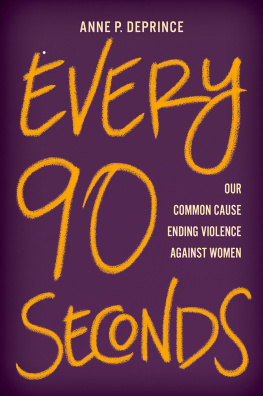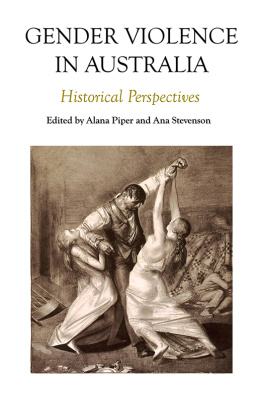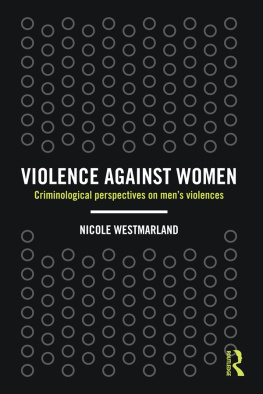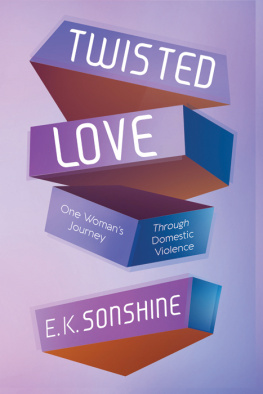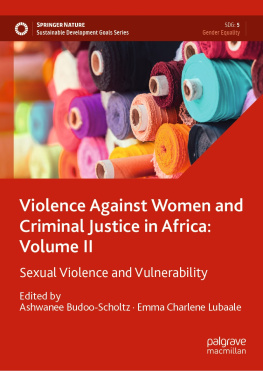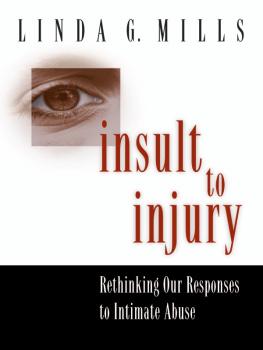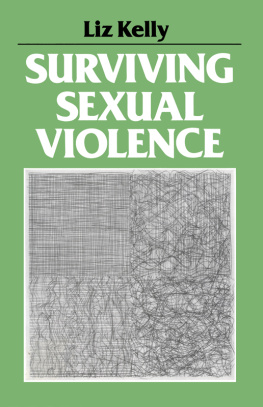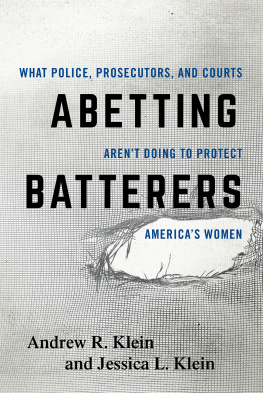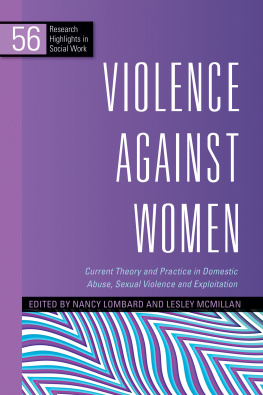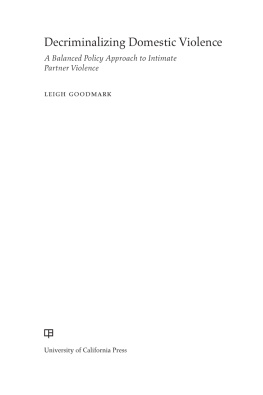Every 90 Seconds

Oxford University Press is a department of the University of Oxford. It furthers the Universitys objective of excellence in research, scholarship, and education by publishing worldwide. Oxford is a registered trade mark of Oxford University Press in the UK and certain other countries.
Published in the United States of America by Oxford University Press
198 Madison Avenue, New York, NY 10016, United States of America.
Anne P. DePrince 2022
All rights reserved. No part of this publication may be reproduced, stored in a retrieval system, or transmitted, in any form or by any means, without the prior permission in writing of Oxford University Press, or as expressly permitted by law, by license, or under terms agreed with the appropriate reproduction rights organization. Inquiries concerning reproduction outside the scope of the above should be sent to the Rights Department, Oxford University Press, at the address above.
You must not circulate this work in any other form and you must impose this same condition on any acquirer.
Library of Congress Cataloging-in-Publication Data
Names: DePrince, Anne P., author.
Title: Every 90 seconds : our common cause ending violence against women /
Anne P. DePrince, Ph.D.
Other titles: Every ninety seconds
Description: New York, NY : Oxford University Press, [2022] |
Includes bibliographical references and index.
Identifiers: LCCN 2021046074 (print) | LCCN 2021046075 (ebook) |
ISBN 9780197545744 (hardback) | ISBN 9780197545768 (epub) |
ISBN 9780197545775
Subjects: LCSH: WomenViolence against. | MeToo movement. |
Intimate partner violence.
Classification: LCC HV6250.4.W65 D475 2022 (print) |
LCC HV6250.4.W65 (ebook) | DDC 362.88082dc23
LC record available at https://lccn.loc.gov/2021046074
LC ebook record available at https://lccn.loc.gov/2021046075
DOI: 10.1093/oso/9780197545744.001.0001
To Susan, with love and gratitude.
Contents
My heart is full of gratitude for the many people who made this book possible. First and foremost, Im forever grateful to the girls and women who participated in the research described throughout this book. Simply put: This book exists because of their willingness to share their stories, experiences, and insights. Thank you, too, to the community partners whose generosity and wisdom made our research collaborations and, ultimately, this book, possible especially Margaret Abrams, Karmen Carter, Maro Casparian, Jennifer Eyl, Kazi Houston, Linda Loflin Pettit, Emily Tofte Nestaval, Steve Siegel, Scott Snow, and Reenie Terjak. They inspire me daily in their stalwart commitment to make our world a more just place.
The graduate students with whom Ive had the honor to work over the years are everywhere in these pagesfrom the research described to the inspiration to make psychology matter for creating a new way forward. Traumatic Stress Studies Group alums have left their mark on our team and this book in particular, especially Drs. Ann T. Chu, Melody Combs, Rebecca Babcock Fenerci, Kerry L. Gagnon, Claire Hebenstreit, Michelle Lee, Ryan Matlow, Julie Olomi, Rheena Pineda, Aimee Reichmann-Decker, Tejaswinhi Srinivas, and Courtney Welton-Mitchell. Im particularly grateful to current graduate student team members who have moved our work forward while providing invaluable feedback (and cheerleading) on early drafts of the book manuscript, including Maria-Ernestina Christl, Kim-Chi Pham, Adi Rosenthal, Rebecca Suzuki, and Naomi Wright. Thank you to Francesca Dino for her work as a research assistant early on in the development of this project.
I am deeply grateful to colleagues who gave detailed feedback on full versions of this manuscript, including Drs. Apryl Alexander, Joanne Belknap, Ann T. Chu, Heather McCauley, and an anonymous reviewer. Their observations and insights are woven into each chapter. I am also incredibly thankful to colleagues whose feedback on the proposal and chapter drafts was essential, including Maro Casparian, Katie Kleinhesselink, and Linda Loflin Pettit as well as Drs. Kathryn Becker-Blease, Joan Cook, Cara DiEnno, Lynn Schofield Clark, and Courtney Welton-Mitchell.
Ive been fortunate to work with many incredible collaborators, colleagues, and friends whose influence runs deep throughout my work and this book, especially Drs. Joanne Belknap, Kim Bender, Ann Chu, Joan Cook, Martin Dorahy, Julia Dmitrieva, Jennifer Freyd, Kim Gorgens, Jennifer Karas, Stephen Shirk, and Sarah Watamura. Im also grateful to be part of a network of scholars working across disciplines around the world to understand traumaparticularly violence against womenand its consequences. While Ive cited many of those scholars in this book, there wasnt space to discuss so much important and exciting research that will be essential to our collective efforts to end violence against women going forward.
I acknowledge and honor the Indigenous peoples of the land on which I have had the privilege to live and work. I recognize the long history and current reality of intimate violence perpetrated against Indigenous girls and women and hope this book can contribute to the work of healing and justice.
Research studies involving my team that are described in this book were made possible by funding from several sources, including the National Institute of Justice (2012-W9-BX-0049, NIJ-2009-MU-MU-0025, 2007-WG-BX-0002), Office for Victims of Crimes (2012-VF-GX-K018) (US Department of Justice), National Institute of Mental Health (1 R03 MH068624-01A1), MINDSOURCE Brain Injury Network and Office for Victim Programs (State of Colorado), Rocky Mountain Victim Law Center, Campus Compact of the Mountain West, and the University of Denver. The opinions, findings, and conclusions or recommendations expressed in this book are mine and do not necessarily reflect those of the Department of Justice or any other funding agency.
Thank you to my agent Deirdre Mullane for seeing the potential in the project, making the foundation as strong as possible, and guiding me through the process with grace and humor. Thank you to Sarah Harrington at Oxford University Press for the perfect combination of feedback, collaboration, and room to realize the vision I had for the book.
Its hard to put into words the impact of a handful of people (and dogs) who have brought me joy and inspiration in life generally and during this books journey specifically. Im forever grateful to Elizabeth, who encouraged me at every turn in this writing adventure; Margaret and Francine, who amaze me in a million ways; Jenny, my constant BFF; and the dogs who spent many very early mornings and long walks with me and this book.
Finally, thank you to my partner, Susan. Years ago, she told me that she heard a book idea in a lecture I gave. Her belief in that idea and in me has been everything.
I arrived to a high-ceilinged hotel mezzanine as the lights of downtown Denver flickered through enormous glass windows in 2017. In terribly uncomfortable shoes, I made my way over to a group of women I had known over many years of collaborating with agencies in Colorado to do research on violence against women. Gathered for a fundraiser and dressed in far different clothes than we usually wore when we met across conference rooms, our conversations differed, too. Earlier that week, the movement that Tarana Burke started in 2006 had exploded onto social media as #MeToo in the wake of reporting about media mogul Harvey Weinstein.

